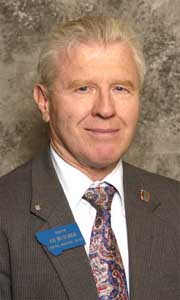-
- Fight against ‘judicial activism’ to continue despite election
- Catholic bishops pass guidelines to gay ministry
- Gay rights leader says election produced solid gains for gay community
- Mass. lawmakers delay decision to put same-sex marriage amendment on ballot
- HIV patients live years after diagnosis
- Houston landscaper accused of refusing service to gay couple
- National News Briefs
- World News Briefs
national
Fight against ‘judicial activism’ to continue despite election
Judicial critics suffer Election Day setbacks, vow to keep fighting against a judiciary they say has lost touch with America
Published Thursday, 16-Nov-2006 in issue 986
WASHINGTON (AP) – Efforts to curb judges’ independence suffered some Election Day setbacks, but supporters pledged to keep fighting against a judiciary they say has lost touch with America.
The problem, critics say, is that judges too often make laws rather than interpret them. On Nov. 7 ballots, the possible solutions ranged from term limits to prison time. All failed, most by wide margins.
Judges say such efforts threaten their autonomy and some legal scholars see them as part of an organized campaign to persuade voters that judges, like legislators, governors and presidents, are policymakers who need political oversight.
The frontier of the movement was South Dakota, where voters considered allowing judges to face lawsuits or jail time for their opinions.
“People are not going to allow judges to take over this county,” said Ron Branson, who conceived the South Dakota measure and is promoting it nationwide. “They talk about judicial independence but they’re getting involved in things they have no power to order.”
Nine out of 10 voters rejected the idea but Branson predicted it would take hold in one of several states with active chapters in the “Jail4Judges” campaign.
In Montana, three Republican legislators backed a proposal that would have allowed judges to face recall for any reason. The measure was voted upon but the results weren’t counted because judges found fraud and deception in the petition drive. Supporters of the measure said it was just another arbitrary ruling by the courts.
“We’re not off-the-wall people. We’re three leadership people in the Montana House of Representatives,” said state Rep. Ed Butcher, who said they were trying to send a message that jurists “have to be judges rather than legislators.”
It’s a familiar refrain in these debates. Critics, frequently conservatives, have used the phrase “activist judges” to refer to jurists they say are legislating from the bench.
President Bush has used the term to criticize opinions such as the court-ordered legalization of same-sex marriage in Massachusetts.
Anti-court sentiment is growing. The Justice at Stake Campaign, an effort to keep the judiciary independent, called the 2006 election “the most threatening election yet for fair and impartial courts.”
“I’m increasingly concerned about the current climate of challenge to judicial independence,” retired Supreme Court Justice Sandra Day O’Connor recently told a gathering of state judges. “Unhappiness with judges today is at a very intense level.”
That unhappiness was clear in Oregon, where people wrote impassioned statements supporting a measure requiring that appellate judges be selected from diverse areas of the state. The courts currently are dominated by city judges who are reinterpreting the state constitution, supporters of the measure said.
“The Oregon Supreme Court has substantially expanded the rights of criminals, limited the rights of property owners and limited the initiative process,” victims’ rights advocate Steve Doell wrote for a voter’s guide. “Many of the changes instituted by the court are more properly the responsibility of the legislature or of the people.”
A similar argument was used to support a Colorado proposal that would have imposed 10-year term limits on judges. Both measures failed at the polls.
Such proposals reflect a political strategy, said University of Pennsylvania law professor Stephen B. Burbank. If voters are persuaded to see judges as representing constituents or policies rather than simply interpreting the law, it will be easier to pass laws limiting their independence, he said.
|
|
Copyright © 2003-2025 Uptown Publications


